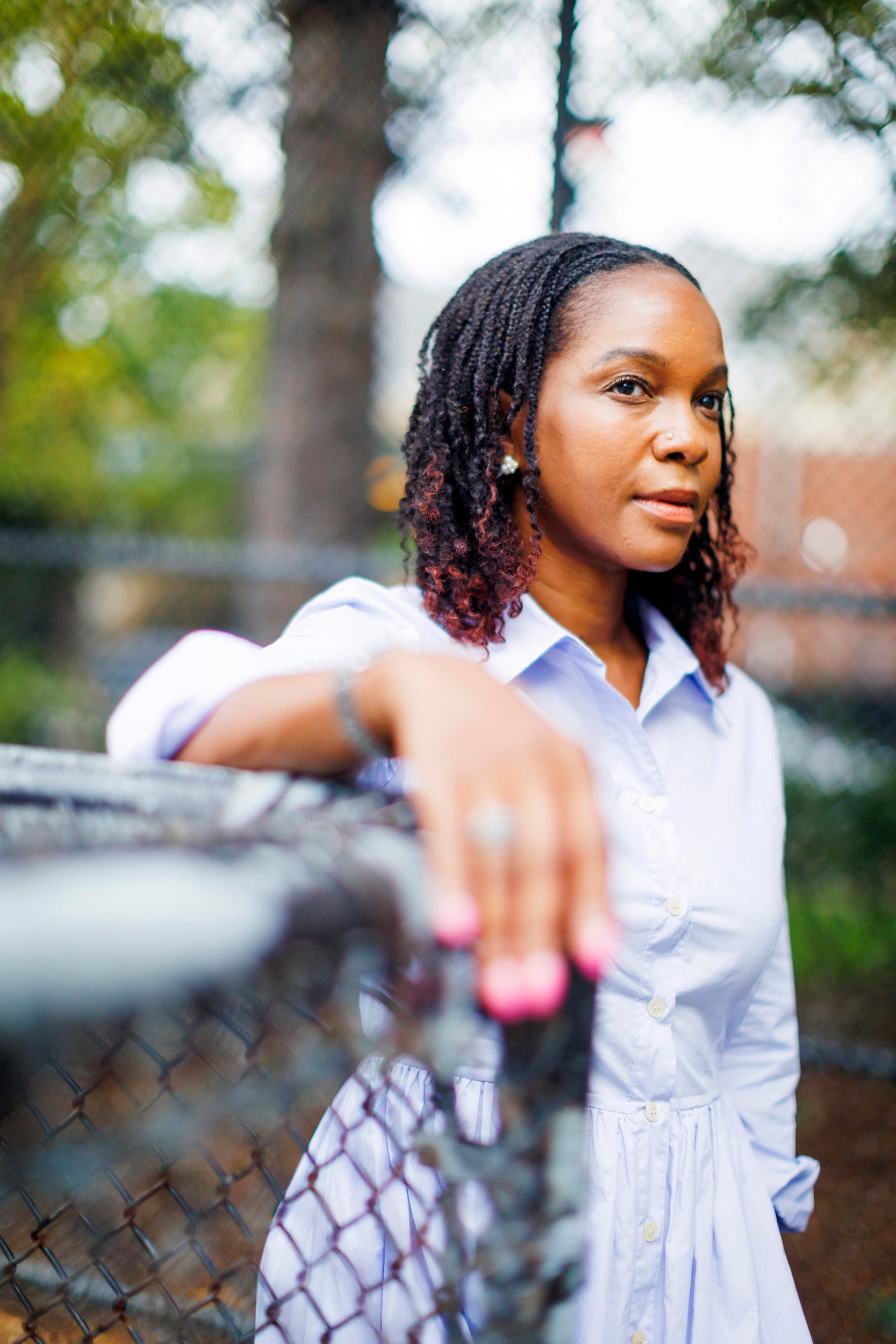Imani Perry’s arrival marks homecoming, expansion
Accomplished scholar, National Book Award winner will blend teaching in African American studies, women and gender studies

Imani Perry is the Henry A. Morss Jr. and Elisabeth W. Morss Professor of Studies of Women, Gender and Sexuality and of African and African American Studies.
Stephanie Mitchell/Harvard Staff Photographer
In her National Book Award-winning “South to America,” Imani Perry journeys below the Mason-Dixon Line for a highly personal, poetic exploration of the region she considers her true home.
“But you know, I came to Cambridge when I was 5 years old for my mother to go to graduate school,” said the Alabama-born author and veteran African American studies professor, who returned after her undergrad at Yale to earn a J.D. and Ph.D. at Harvard in 2000. “I have this repeated movement to Cambridge over the course of my life.”
In addition to her 2022 bestseller on the American South, Perry is known for titles including “Looking for Lorraine: The Radiant and Radical Life of Lorraine Hansberry” (2018) and “Breathe: A Letter to My Sons” (2019).
As of this summer, Perry has landed back at Harvard as the Henry A. Morss Jr. and Elisabeth W. Morss Professor of Studies of Women, Gender and Sexuality and of African and African American Studies. She also holds the title of Carol K. Pforzheimer Professor at the Harvard Radcliffe Institute. We caught up with her on one of her first days back.
This interview was edited for length and clarity.
Q&A
Imani Perry
GAZETTE: What drew you back to Harvard?
PERRY: My mother still lives in Massachusetts; that’s certainly a big draw. I still have intellectual interlocutors who are on the faculty but also in area institutions. And I’m excited about continuing my work in African American studies while also formally being in women and gender studies. Fourteen years ago, I switched from legal academia to African American studies. I feel like moving into gender studies is another kind of expansion. Over the past decade, so much of my work has been about the politics of gender and sexuality.
GAZETTE: Let’s talk about your work as a writer. After the success of “South to America,” you published an audiobook about living with the autoimmune disease lupus.
PERRY: Also Graves’ disease, which doesn’t get as much attention.
GAZETTE: It was a very personal project, excerpted earlier this year in The New York Times. How are you doing now?
PERRY: I’m good. When you write a story of living with disease, I think it often comes across as though you’re in crisis. I’m actually in a very good place, thank goodness, with managing my diseases. I’m also looking forward to seeing the doctor who got me through graduate school, Dr. Glenn Rothfeld, who’s still in practice in Massachusetts. He feels at this point as much a friend as a doctor. He’s the person who really put me on the path of a holistic approach to healthcare.
GAZETTE: What’s next for you as a writer?
PERRY: My next book doesn’t have a definitive title yet, but it’ll probably be called “Black in Blue.” It’s the story of how Black people became understood as Black and came to understand themselves as Black through the history of a relationship to the color blue. It goes from the 16th century to the present and through things as varied as water and sky but also indigo and the blues and the use of the color blue in Hoodoo and Vodun.
GAZETTE: Tell me about the book you just edited, which is due out in September.
PERRY: I was fortunate to be asked by Hachette and the Ntozake Shange estate to edit a collection of her unpublished writing. Even though Shange was so prolific, and published so much, there was still this beautiful body of material the world hadn’t seen yet.
In so many ways she followed [“A Raisin in the Sun” playwright] Lorraine Hansberry in opening doors for Black women in American theater. That felt like a wonderful connection. I also remember being in Cambridge as a kid, and my mother would always perform the Lady in Green character from [Shange’s 1976 play] “for colored girls [who have considered suicide / when the rainbow is enuf]” at parties and the like.
GAZETTE: I see you’re teaching a course this fall on Black feminist theory. Can you tell me about it?
PERRY: It traces ideas about how gender and race function specifically in the lives of Black women. People often talk about intersectionality, which is a piece of it, but I’m also interested in citizenship and power and racialization and relations to property and sexuality. I’m hoping to give students a kind of genealogy of ideas they can take not just to other academic work, but to interpret the world around them.
GAZETTE: Who will you read in the class?
PERRY: People as varied as Angela Davis and Hortense Spillers and Frances Ellen Watkins Harper and Ida B. Wells. It’s a pretty wide range, with several hundred years of thinkers.
GAZETTE: Any Harvard collaborations you’re particularly excited about?
PERRY: I’ve been working with [Professor of Education] Jarvis Givens on the Black Teacher Archive project. It is a digital repository of the journals and other relevant materials of what were called Colored Teacher Associations, professional organizations of teachers in segregated schools in the late 19th through the late 20th century. The archive is housed at Harvard’s libraries, and we have the launch at the Harvard Graduate School of Education on Oct. 3.
GAZETTE: Any old Cambridge haunts you look forward to revisiting?
PERRY: I would love to walk by Peabody Terrace, the apartment complex where my family lived when we first moved here. I do want to write about it at some point. When I was a kid, [NBA veteran and former Georgetown basketball coach] Patrick Ewing was a high school student. I could see him out my window playing ball at the Corporal Burns basketball court.




